
Feature
1988 World Championship Season “What A Team!”
By Robert Schweppe
In a year that has been so improbable…..
Vin Scully
October 15, 1988, Game 1 of the 1988 World Series
Scully is baseball’s greatest broadcaster and wordsmith ever, and his call of Kirk Gibson 1988 World Series Game 1 home run is a proclamation for the ages.
1988 was a year of “improbable” we’ll always remember.
And what a team!
Forbes magazine wrote of the Dodgers as if they were a company on the Dow Jones index in their Spring Training Report on April 4, “Classic blue-chip fade. The General Motors of baseball. Overvalued, aging assets, disappointing R&D (research and development). Strong sell.”
Speaking to Sports Illustrated writer Alexander Wolff, Dodger President Peter O’Malley put his support completely behind Dodger Manager Tom Lasorda. O’Malley predicted in the March 7, 1988 issue of the magazine, “I’ll predict right now that Tommy (Lasorda) will do his best job of managing this season.” The prediction would be more than just right as after the 1988 season Lasorda would be named the Manager of the Year by The Sporting News and Baseball America as the Dodgers won the World Championship.
Opening Day at Dodger Stadium, April 4, 1988, opened with a blast and a thud. Steve Sax homered on the first pitch in the bottom of the first inning, something no one recalled that ever happening before. That was all the offense the Dodgers had in a 5-1 loss to the San Francisco Giants.

October 18, 1988
Hall of Famer and greatest baseball broadcaster ever Vin Scully at the dugout level for Game 3 of the 1988 World Series on October 18 at the Oakland-Alameda County Coliseum in Oakland, CA. The Dodgers won the 1988 World Series in 5 games. Scully was then broadcasting play-by-play of the World Series for NBC Sports. His Game 1 broadcast of Kirk Gibson’s dramatic game-winning home run became a sports classic. He would also broadcast the clincher in Game 5 on NBC, as the Dodgers beat the A’s, 5-2.
Undaunted, the Dodgers got off to a good start early in the season. They won 19 of their first 28 games for a three-game lead in first place. Skeptics caustically noted their fast start came from a soft schedule. They did not mention the Dodgers held their opponents on two runs in 10 of those games, winning eight. Already, this season felt different. The club was rained out in three straight home dates in April despite the song “It Never Rains in Southern California.” They went to San Francisco for a series and were rained out the first game, also. This season was going to be different.
They won games in all kinds of ways. On May 10th, Gibson homered in the 14th inning and Orel Hershiser got the save. On June 19th, Hershiser pitched and won the first game of a doubleheader. In the second game, Hershiser put on his uniform and sacrificed so Gibson could drive home the winning run. On June 25th, Brian Holton got the final out of the first inning in relief and when the Dodgers took the lead in the second inning, the official scorer gave him credit for the win. On July 26th, they beat the San Francisco Giants in a doubleheader when the second game ended at 1:21 a.m. It was their third doubleheader win in the previous 12 days. On August 13th, Tim Leary pinch-hit for a pitcher and singled home the winning run. August 20th had Kirk Gibson single home the tying run on a 0-2 pitch and then scoring from second base on a wild pitch.
The Dodgers maintained their winning pace, in large part, to “the Stuntmen.” The name was a parody on the film “The Stunt Man” that was nominated for three Academy Awards in 1980. “The Stuntmen” was a self-named description by the Dodger utility players in the 1987 season because in a season so frustrating, a bench player has to find something to keep his mind focused on his role. “The Stuntmen” would become even more critical in the 1988 season when the clubs decided to have only a 24-man roster. Dodger “Stuntmen” were all types. Replace a regular, be a pinch-hitter, pinch-runner, back-up catcher, pitchers who can bunt, pitchers who pinch-hit, starting pitchers who relieve. Starting shortstop Alfredo Griffin and closer Jay Howell went on the injured list. The “Stuntmen” jumped up and got into position. Dave Anderson filled in for Griffin and Lasorda manipulated his bullpen the best way he could.
The Dodgers had a new battle-cry. Sam McManis of the Los Angeles Times wrote Lasorda, after every win, and especially after a close win, would exclaim loudly, “What a team!” to the happy players in the clubhouse and they would respond in unison. On occasion, when particularly roused by a close victory, adjectives best suited for the clubhouse were provided.
Pete Rose, manager of the Reds was not picking the Dodgers to win the division. After winning an August series against them, the Reds were now six games behind the Dodgers. Rose told Matt McHale of the Los Angeles Daily News, “Of course the Dodgers are not going to win, because we’re going to win it. I just think they are going to come back to reality.” When McManis of the Times told Lasorda of Rose’s quote, Lasorda’s response was philosophical. He said, “What is reality with this team?”
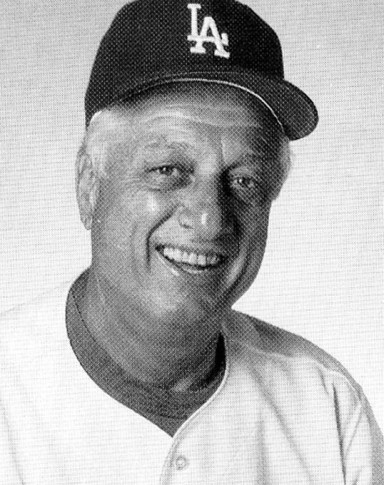
Dodger Manager Tommy Lasorda. Lasorda managed the Dodgers from 1977-1996, when he retired to become a Dodger Vice President. Lasorda’s Dodger clubs won 1,599 games in 20 seasons and World Championships in 1981 and 1988. He was inducted into the National Baseball Hall of Fame in 1997.
On August 30th in Montreal, Orel Hershiser began to break a Major League Baseball record last set in 1968. He pitched the last four scoreless innings for a win in a game over the Expos. He would not allow a run for the remainder of the regular season.
Hershiser pitched five shutout games in September. The scoreless inning streak was almost lost on September 23 in San Francisco. In the third inning, the Giants thought they had scored a run, but umpire Bob Engel ruled offensive interference, the run did not count, the shutout streak continued. Mickey Hatcher hit his only home run of the year to aid in the scoring as the Dodgers won, 3-0. Hershiser had pitched 49 consecutive scoreless innings.
On September 28th, Hershiser blanked the Padres for nine regulation innings and shut them down in the 10th inning for the major league record of 59 innings. Drysdale, then a Dodger broadcaster, and the former major league record holder of the streak, congratulated Hershiser on his return to the dugout.
The Mets were heavy favorites in the National League Championship Series. The Mets had won 100 games in 1988. They had stepped on the Dodgers during the season with 10 wins of 11 games. USA Today had a headline, “Mets Know What’s Ahead. A Dodger Team They Own.”
1988 National League Championship Series
Game 1 of the National League Championship Series opened in Dodger Stadium, the Western Division Champion city. The Dodgers led 2-0 in the ninth inning, but the Mets came back with three runs in the top of the ninth inning to snatch Game 1, 3-2. Discouraged but not downhearted, the Dodgers rose up in Game 2, winning 6-3 with first baseman Mickey Hatcher leading the charge. Lasorda wanted Hatcher in the starting lineup to give them a spark and he doubled home two early runs. Tim Belcher pitched 8 1/3 innings before Howell got the final two outs.
Friday’s Game 3 in New York was rained out and play would resume on Saturday. On Saturday, there was a little rain, but what it left behind from the previous day made for a sloppy track. The temperature was not just cold, but bone chilling. Start time temperature was 43 degrees, but it felt a lot colder. The official scorer’s report on the weather was, one word, “soaked.” The Dodgers led, 4-3 in the eighth inning, but the Mets again came back, encouraged by the ejection of closer Jay Howell who the umpires determined had an improper substance in his glove. To offset the cold weather, Howell had rubbed pine tar inside the mitt for a better grip, the same purpose of the resin bag that always rests on a pitching mound. The Mets scored four runs after Howell’s departure to take a 2-1 series lead.
Sunday, October 9 was not a good start for the Dodgers. The angry weather that had followed them all day in Game 3 had gone out to sea and conditions were good for Game 4. Not so good was the ruling by the National League President, Bart Giamatti, who suspended Howell for Games 4, 5, and 6 after Howell’s ejection in Game 3.
The Dodgers would have to do without their closer. Worse, the burden of carrying only a 24-man roster as required by the teams had meant the Dodgers carried nine pitchers eligible for post-season, and now they were down to eight active pitchers with Howell not available. And, you can subtract one more active pitcher, because Tim Belcher had returned to the team hotel to be fully rested for the noon game the next day.
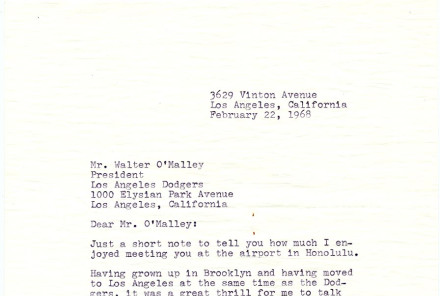
February 22, 1968. Letter from nationally recognized sportscaster Al Michaels to Walter O’Malley thanking O’Malley for recently meeting him at an airport. Michaels was the lead broadcaster for ABC-TV coverage of the National League Championship Series when the Dodgers won in seven games over the New York Mets and described Scioscia’s and Gibson’s Game 4 home runs and Hershiser’s final out save.
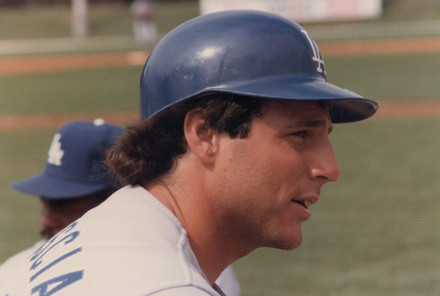
Mike Scioscia played catcher for the Dodgers from 1980-1992, was a two-time National League All-Star and a member of two World Championship Dodger teams (1981 and 1988). He was considered one of the top catchers in the game for his ability to work with pitchers and call games, as well as his defensive prowess. He was the catcher for the Dodgers at the age of 22 when Fernando Valenzuela pitched his Opening Day shutout in 1981. He is a 1988 Dodger hero when he homered off the Mets in the ninth inning to tie the game at 4-all in Game 4 of the NLCS. Scioscia hit only eight home runs in 1988, but his two-run home run gave the Dodgers the chance to win the game, 5-4 in the 12th inning.
The Mets led the Dodgers, 4-2, going into the ninth inning. A Mets win would give them a commanding 3-1 LCS lead. At the start of the ninth inning, ABC-TV broadcaster Al Michaels, thanked the members of the ABC-TV crew for the telecast and read a promo for Monday Night Football, the usual signs of a broadcaster preparing to wrap up the telecast. John Shelby led off for the Dodgers in the ninth inning and drew a walk. In one of the greatest postseason home runs in Dodger history, Mike Scioscia tied the game on the first pitch. The score was now 4-4. With the pitching staff at a new low for pitchers, a hurried discussion was held in the Dodger dugout as to, “Should Tim Belcher return to the ballpark from the hotel if the game went too far in extra innings.” Lasorda considered it, but rejected the concept to keep his starting pitcher fresh for Game 5. Belcher was called to be told to remain at the team hotel for a good night’s sleep.

The 1988 Commissioner’s World Championship Trophy for winning the World Series is on display along the parade route in downtown Los Angeles to celebrate the Dodgers’ four games to one victory against Oakland for the World Championship, their sixth in team history.
Before the game started back on Sunday, author Josh Suchon wrote Lasorda had told his team in the clubhouse they would win Game 4 “with or without Jay Howell.” Motivated by his manager, Hershiser went to Lasorda and said confidently, “I’ll be your Jay Howell tonight.” Lasorda told Matt McHale of the Los Angeles Daily News after the game what he said when Hershiser went to his manager before the game. Lasorda said, “That’s the way he is. He wouldn’t hesitate going to the bullpen. He has the arm and the attitude for it. But I’m not going to use him. No, no, no way.”
And that promise came back to Hershiser as the Dodgers batted in the 12th inning. And Orel made a decision. He left the dugout to go change in the clubhouse because he wasn’t wearing a uniform top, just a t-shirt and a windbreaker to keep his arm warm. Inside the Dodger clubhouse, he put on a uniform top and was asked what he was doing. He told Kevin Modesti and McHale of the Los Angeles Daily News, “I’m getting ready to pitch. Timmy (Leary) is the last right hander except for me. If we go ahead here, Tommy (Lasorda) might need me.”
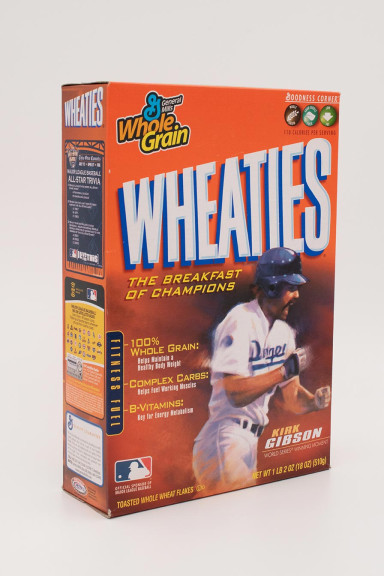
Dodger outfielder Kirk Gibson was commemorated on a Wheaties cereal box (released June 7, 2005) for his heroics in the 1988 World Series.
In the 12th inning, Kirk Gibson was 1 for 16 in the Series, was already 0 for 5 in the game and had not hit the ball out of the infield. After swinging and missing on the first pitch, Gibson proved Hershiser right when he homered to right center field, giving the Dodgers a 5-4 lead. As the ball went over the fence, the stadium clock registered 12:27 a.m., on Monday, October 10. ABC-TV broadcaster Michaels said as Gibson was congratulated in the dugout, “That might be the quietest home run hit in the history of baseball,” as the Shea Stadium crowd could only watch.
Hershiser went down the tunnel from the clubhouse to the Dodger bullpen. Bullpen coach Mark Cresse, as reported by author Suchon, asked Hershiser, “What are you doing here?” Orel didn’t lie to Cresse, he just said he came to the bullpen to get ready. That didn’t sound quite right to Cresse and he called the Dodger dugout to verify what Hershiser had said. Mike Lupica in 2020 for MLB.com, said Cresse told Lasorda, “Tommy, Bulldog (Hershiser’s nickname) is out here. What should I do?” Lupica wrote Lasorda’s response was “Warm him up.”
The ABC-TV camera then focused on Hershiser beginning to throw. ABC-TV broadcaster Michaels exclaimed, “Is that Hershiser in the bullpen?” It was. Future Hall of Fame pitcher Jim Palmer said, “How bizarre is this?” The no response by Palmer answered his own question.

Dodger pitcher Ron Perranoski, 1961-1967; 1972; Dodger pitching coach 1981-1994.
After Jesse Orosco retired Darryl Strawberry on a pop fly with the bases loaded for the second out, Suchon wrote, Lasorda told his pitching coach, Ron Perranoski, “I’m putting the pot of gold on the Bulldog!” Perranoski followed his order and walked out to remove Orosco, and bring in Hershiser. Al Michaels said, “This game is unbelievable!” As Hershiser first walked, then began a slow jog to the mound, Tim McCarver said, “This is truly all or nothing at all.” Michaels said, “Never in your wildest dreams would you ever imagine Orel Hershiser coming in to pitch.”
ABC-TV commentator Palmer said quite correctly, “You have to play for today, and today is or actually yesterday, when this game started, and now tomorrow.” Michaels mentioned the possibility of the game being tied at the end of the inning and “it would be Lasorda’s worst nightmare for this game to wind up tied through 12 (innings).” He corrected himself, “Well, it’s his second worst nightmare (should the Dodgers lose), but you know what I mean.” If the Mets would score one run and only tie the score, no one knew who would pitch for the Dodgers, unless it was Hershiser who would keep going.
Hershiser pitched from a windup and not from the stretch. Hershiser was asked what would have happened if the game had been tied and continued on to the 13th inning. He told Steve Dilbeck of USA Today, “I think we would have been on the phone to the hotel to get Timmy Belcher out of bed and on the subway — or on a helicopter. I wasn’t going to be out there very long.”
McReynolds swung at the 1-1 pitch and Michaels raised his voice, “Broken bat looper…shallow center field….in COMES SHELBY AND MAKES THE CATCH!” Seconds later, Michaels’ next sentence was “When you write the story of this game, where in the world do you begin?”

John Shelby, assigned to the minor leagues in 1987, acquired for his talent and character, who made a valiant attempt in Game 1 to catch a pop fly double only to have the ball hit his glove but he couldn’t hold it as the winning run scored, who rarely walked, but drew a walk in the ninth inning so Mike Scioscia could tie the game with a home run, again on a nearly identical play from Game 1, a bloop to center field with the game on the line, but this time, he made the catch, grabbing the ball just about knee high. After he caught it, he continued running, his trophy safe in his glove. The Hershiser save and the game-saving catch tied the Series at two.
“What a team!” rang through the Dodger clubhouse. They were ready to play Game 5 right now, and it was less than 11 hours away from the noon start time on Monday.
The Dodgers came out big in Game 5. They scored three runs in the fourth inning. In the fifth inning, Gibson hit a three-run home run for a 6-0 lead. The Mets fought back. They got themselves right back into the game when Lenny Dykstra hit a three-run home run. Leading 6-4 in the eighth inning, Lasorda needed to use spot relief pitchers Ricky Horton and Brian Holton. Lasorda’s bullpen was deeper than what he had 12 hours earlier. Hershiser had told Lasorda before the game he was available. As Holton came in, the ABC-TV camera then focused on a right hand pitcher warming up for the Dodgers in their bullpen. It was Hershiser. Instead of saying, “Do you believe in miracles?” Michaels said, “Do you believe this?,” as to the sight of Hershiser beginning to throw. Holton retired Gary Carter with the bases loaded for the final out in the eighth inning and retired the side in order in the ninth for the save.
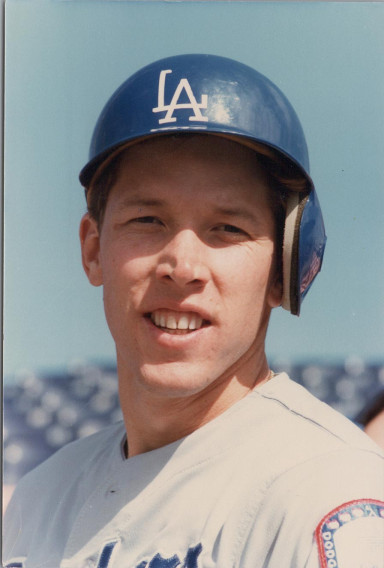
Dodger pitcher Orel Hershiser at Dodgertown, Vero Beach, Florida during Spring Training, 1984. Hershiser pitched 13 seasons for the Dodgers from 1983-1994 and again in 2000. He was the Most Valuable Player of the 1988 National League Championship Series when he pitched a shutout in Game 7 over the New York Mets to send the Dodgers to the World Series.
The Dodgers and Mets returned to Dodger Stadium for Game 6 and it was all Mets in a 5-1 win. Game 7 would have Orel starting for the Dodgers. Mets’ Manager Davey Johnson said in the book “Miracle Men” before the game started, hoping against hope, “He’s (Orel) going to have to be Superman. I don’t expect him to have much stuff.” The Mets wanted to make Hershiser work. In the first inning Hershiser took 29 pitches to face five hitters. And the Mets’ plan seemed to have worked. But, the Dodgers wanted to get off to a fast start and they did just that when Sax singled, Hatcher doubled and Gibson hit a deep fly out to center field, and for the sixth time in seven games, the Dodgers had scored first against the Mets.
The early Dodger run settled down Hershiser. His sinker did not sink well, but Hershiser was getting outs. The Dodger second inning was a five-run outburst and Hershiser began accumulating outs one at a time. In the last seven innings of the game, the Mets had three runners in scoring position and none scored.

Hershiser fanned the final hitter of the game in the ninth inning and went to his knees in gratitude. All the perils, storms, and frustration of 1986 and 1987 washed away and the Dodgers would face Oakland in the World Series.
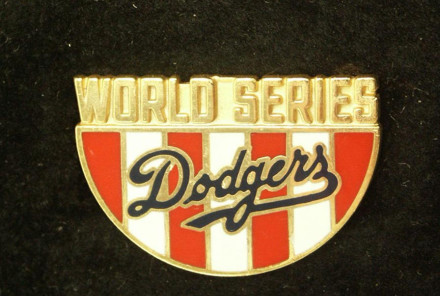
On October 20, 1988, the Dodgers won their sixth World Series Championship, defeating the Oakland Athletics, four games to one. This is the official Dodger World Series press pin from 1988.
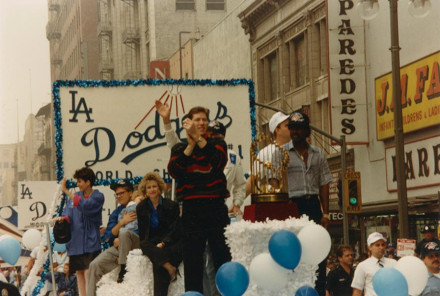
The 1988 World Champion Los Angeles Dodgers were celebrated with a parade throughout the streets of downtown Los Angeles on October 24, 1988. World Series MVP Orel Hershiser stands in front of the float. Dodger shortstop Alfredo Griffin stands next to the 1988 World Championship Commissioner’s Trophy.
October 15, Game 1, 1988 World Series
The World Series would be all-California as the Oakland A’s, winners of 104 games in the regular season, met the Dodgers. Mickey Hatcher hit a two-run home run in the bottom of the first inning, tying his regular season mark, but the A’s struck back forcefully when Jose Canseco hit a grand-slam. The Dodgers clawed back with one run in the sixth inning, but they still trailed in the ninth inning, 4-3.
Dennis Eckersley, one of baseball’s best closers for Oakland, retired the first two hitters quickly in the ninth inning. With only one out left, Lasorda sent up Mike Davis to pinch-hit. Davis who had struggled all season because of an ankle injury suffered in March, fought Eckersley and drew a walk.

A serigraph of the painting by renowned sports artist LeRoy Neiman to celebrate the 100th Anniversary of the Dodger organization in 1990. The internationally celebrated artist in his impressionistic work Dodger Stadium in Los Angeles, Ebbets Field in Los Angeles in the top and bottom corners. Neiman also stylized Dodger greats from the top as Fernando Valenzuela, Jackie Robinson, Kirk Gibson hitting his 1988 World Series home run, Zack Wheat, Duke Snider and Sandy Koufax.
Broadcaster Scully mentioned on-air early in the game, Gibson would not be available to play. Hearing that on the television, Gibson began to get dressed and got a bat to see if he could hit. He had a clubhouse man lob soft tosses and Gibson swung and made contact. He told Mitch Poole, the clubbie, to let Lasorda know he could pinch-hit. The count went to 3-2. Gibson then swung at the full count offering to create what the Los Angeles Sports Council voted as the “Greatest Moment in Los Angeles Sports History”, a two-out, full count, two-run home run to win Game 1, 5-4. Vin Scully said, “High fly ball to right field….she is gone!” The broadcaster then waited 45 seconds as the crowd cheered and cheered and said, “In a year that has been so improbable, the impossible has happened!” The greatest broadcaster ever had given one of his greatest calls. The Dodgers had a 1-0 World Series lead.

Game 2 had great highlights, just not a walk-off home run. Orel Hershiser not only pitched a shutout, he had three hits, scored the Dodgers’ first run, and drove in a run in a 6-0 win and the Dodgers had a 2-0 World Series lead.
For Game 3, the A’s were going home, but facing a two-game deficit. The Dodgers would lose starting pitcher John Tudor to injury in the game, but they continued to fight. In the ninth inning, Mark McGwire of the A’s homered off Jay Howell and the A’s won Game 3, 2-1.

October 20, 1988, Dodgers clubhouse, Oakland-Alameda County Coliseum. Dodger outfielder Kirk Gibson, hero of Game 1 of the 1988 World Series, moments after the final out in Game 5, pours champagne in the clubhouse in celebration of winning the World Championship in five games at Oakland. The player he is drenching is thought to be catcher Mike Scioscia. It was Gibson’s Game 1, two out, full count, two run home run that helped the Dodgers to a 5-4 victory. The moment was later branded “Los Angeles’ Greatest Sports Moment.”

Celebrating the 1988 World Championship in the Dodger clubhouse at Oakland-Alameda County Coliseum, October 20, 1988. L-R: Dodger President Peter O’Malley; World Series MVP Orel Hershiser; Dodger Executive Vice President, Player Personnel Fred Claire; Dodger Manager Tommy Lasorda; and NBC Sports broadcaster Bob Costas. Before Game 4, Costas had said the Dodgers had the worst starting lineup in World Series history. Motivated by the statement, the Dodgers won Game 4 and then defeated the Oakland Athletics in five games to win their sixth World Championship.
Game 4 had fireworks before the game. NBC broadcaster Bob Costas, in the pre-game show, made a statement referring to the Dodgers’ starting lineup as the worst ever in World Series history. The Dodgers went out to an early lead, 3-1 and held on to win 4-3. Jay Howell, who had allowed the winning home run the night before, pitched 2 1/3 scoreless innings for the save. Lasorda, now in an ebullient mood in a post-game interview, thanked Costas for his pre-game statement and how it helped his team. Costas, a good sport, took the banter from Lasorda well. However, Mike Scioscia injured his knee in the win and was not likely to return for the remainder of the Series. The Dodgers were down to one catcher, Rick Dempsey, and Tudor and Gibson were doubtful to be available for Game 5.
Game 5 would be Hershiser for the Dodgers. Mickey Hatcher, leader of the “Stuntmen,” hit his second home run of the World Series to give them an early lead. Mike Davis, a former A’s player, who kept the Dodgers alive in Game 1 with his two-out walk ahead of Gibson, hit a two-run home run on a 3-1 count in the fourth inning. The A’s made one last rally in the eighth inning. With one out, the A’s had the tying run at the plate in Jose Canseco and Dave Parker on deck. Hershiser got Canseco to pop out and he struck out Parker.
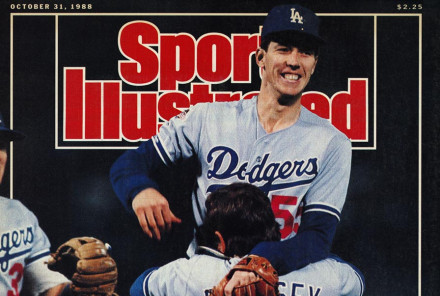
October 31, 1988, Sports Illustrated magazine cover featuring Dodger pitcher Orel Hershiser seconds after the final out of Game 5 of the 1988 World Series. The Dodgers won their sixth World Championship as they defeated the Oakland Athletics, 5-2. Hershiser won Game 2 and Game 5 and was named Series MVP. He finished the 1988 season with a record 59 consecutive scoreless innings and was named the National League Cy Young Award winner. Sports Illustrated named him 1988 Sportsperson of the Year.
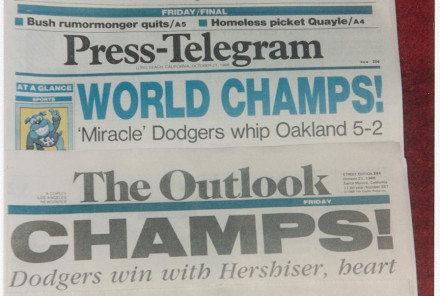
Newspaper headlines and coverage in the Los Angeles area on October 21, 1988, the day after the Dodgers won their sixth World Championship in history, beating the Oakland Athletics in five games.
As Hershiser sat on the bench during the Dodgers’ ninth inning, he noticed the red light of a NBC television camera indicating he was on screen. Unbowed, with steely confidence, Hershiser mouthed, “Three more outs.” He retired the first two A’s hitters, and after an infield single, fanned the final hitter for the Dodgers’ memorable, clinching World Series victory.
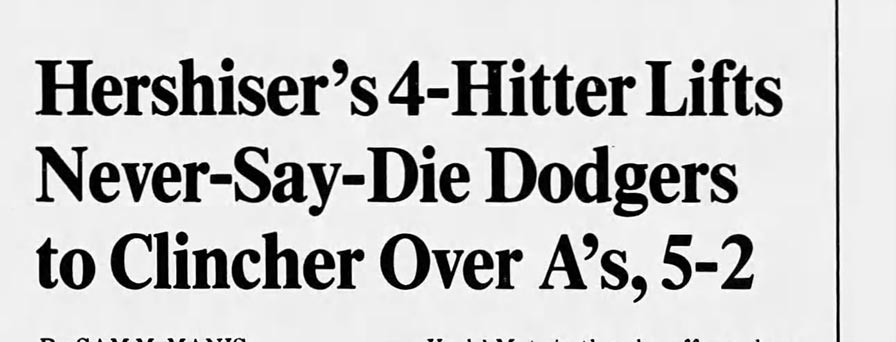
The 1988 season was one of the organization’s greatest accomplishments, a feat that still is revered by Dodger fans and appreciated by baseball fans. On October 24, 1988, the day of the World Championship reception at City Hall, Hall of Fame broadcaster Vin Scully opened the ceremony by saying, “Good afternoon, ladies and gentlemen and a very pleasant day to you on Cloud 9!”
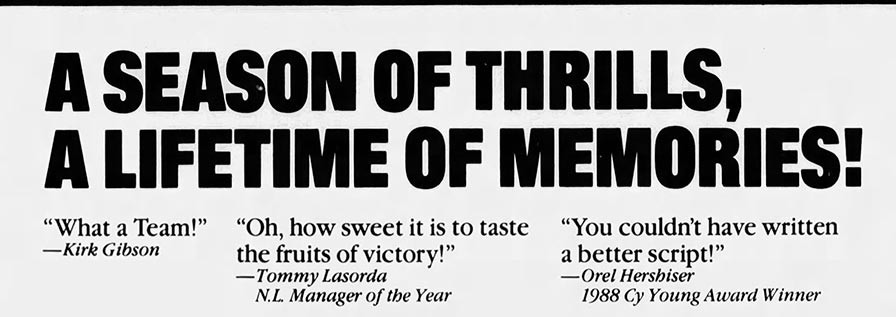
The season is best summed up by a promotional note that appeared on the Dodgers’ 1988 World Series film. The sub note on the video cassette had a line that captured all of the 1988 season, “A season of thrills, a lifetime of memories.” The line was so striking it was used on a first day stamp commemoration envelope the next season. And even into the 21st century, for every Dodger player and Dodger fan who was there, 1988 remains that season of thrills and remains in the memory of everyone’s lifetime.

October 26, 1988, the World Champion Los Angeles Dodgers gather for an Oval Office portrait with U.S. President Ronald Reagan and Mrs. Nancy Reagan during their visit to the White House. Front row (l-r): Dodger Hall of Fame catcher Roy Campanella; Terry O’Malley Seidler; Hall of Fame broadcaster Vin Scully; Rollie Seidler, husband of Terry O’Malley Seidler; Dodger pitcher and 1988 World Series MVP Orel Hershiser; President Reagan; First Lady Nancy Reagan; Dodger Manager Tommy Lasorda; Dodger Vice President Fred Claire; Baseball Commissioner Counsel Edwin Durso; Dodger President Peter O’Malley.





